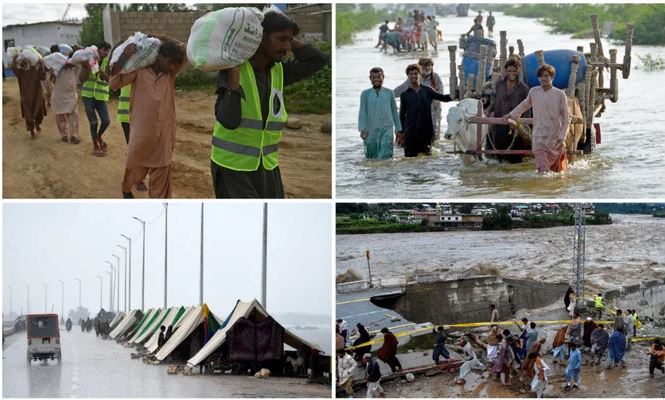KARACHI, Sindh / QUETTA, Balochistan: Torrential monsoon rains and resultant flooding have caused widespread death and destruction in Pakistan’s Sindh and Balochistan provinces. As of Monday, more than 600 lives had been lost and 1.5 million people displaced in the two worst-hit regions.
The downpours have killed at least 1,136 people in Pakistan since the onset of the monsoon season, according to the National Disaster Management Authority, with Sindh and Balochistan accounting for 646 of the total fatalities since mid-June.
In Sindh, 402 people have died, while the official figure for Balochistan is 244. The floodwaters are reported to have damaged 3,328 kilometers of roads and washed away nearly 80 bridges in the two provinces.
In Sindh, rains have partially or fully damaged 43,874 houses, while at least a further 61,000 homes have been damaged in Balochistan. These figures are conservative estimates as thousands of villages in the two provinces are either inaccessible or authorities have yet to reach them.
“Almost a month has passed since our village was inundated but no one has reached out to us with any help,” Abdul Rehman Narejo, a teacher in Abdullah Narejo village, on the bank of the Indus River in Sindh’s Khairpur district, told Arab News.
“Our children are starving. We sleep in the open out of fear that that roof will fall on us.”
A two-room government school was sheltering more than 50 women and children on Sunday when Arab News visited the village, where many homes have been damaged.
Speaking to Arab News, Murad Ali Shah, the chief minister of Sindh, described the rainfall this season as “unprecedented.”
“The ongoing monsoon rains are unprecedented,” he said. “July has witnessed 308 percent higher, while August has recorded 784 percent above the average rainfall.
“The flooding in Sindh has affected 23 districts and 201 sub-divisions and has caused an estimated damage of PKR550 billion ($2.49 billion).”
He said standing crops of cotton, date, sugarcane, rice, and vegetables on 2,845,046 acres of cultivated land had been destroyed, inflicting an estimated loss of PKR295 million.
On the positive side, Shah said 105,000 tents had been distributed and 750,000 ration bags had been ordered for distribution in Sindh, but the aid was insufficient to cover the 1.67 million people displaced throughout the province.
“To provide relief to over 1.67 million people, Sindh needs immediate help from the international community. We have spoken to diplomats of Saudi Arabia, the UAE, Turkey, and Iran for their assistance,” he said.
Bilawal Bhutto-Zardari, Pakistan’s foreign minister, who last week called off his Europe trip and reached his hometown of Larkana in Sindh, has also appealed to the international community for help in dealing with the “overwhelming” floods.
Saudi Arabia’s KSrelief was the first international charity to step in, sending 100 trucks carrying 950 tons of food items to 17 flood-ravaged districts of Pakistan last week. The consignment included 10,000 food packages. So far dispatched three convoys of essential food items have been dispatched.
Humanitarian assistance has also arrived from Turkey, while a flight from the UAE brought more than 3,000 tons of critical aid. At least another 15 flights carrying relief supplies are expected to arrive in Pakistan from the UAE in the coming days.
According to Shah, there was every prospect of more flood damage in Sindh. “The province has not only received record rains, the Indus River is taking more and more water from northern Pakistan, aggravating the situation. The situation is complicated.”
He said there was a need to map water channels and remove encroachments on waterways in urban areas. For good measure, he said, the Balochistan environment department would issue notices to departments and officials that failed to abide by environmental protection laws.
For 80 percent of the estimated 12.34 million people of Balochistan, agriculture and livestock are their only livelihoods, but the deluge has wreaked havoc. More than 200,000 acres of rice and wheat crops have been destroyed and an estimated 145,936 farm animals were washed away.
According to Arshad Hussain Bugti, the Balochistan livestock and dairy development secretary, the floods have inflicted huge losses as almost the entire rural population of the province used livestock to supplement their incomes.
“Right now, people are sitting on roads with their cattle and our teams have been traveling to all accessible areas to vaccinate animals. But there are many inaccessible areas that cannot be reached until the water level drops,” he told Arab News.
He said those with livestock preferred to live close to rivers and water channels where there were green lands, but now the authorities had made them aware of the reality of climate change and its consequences.

